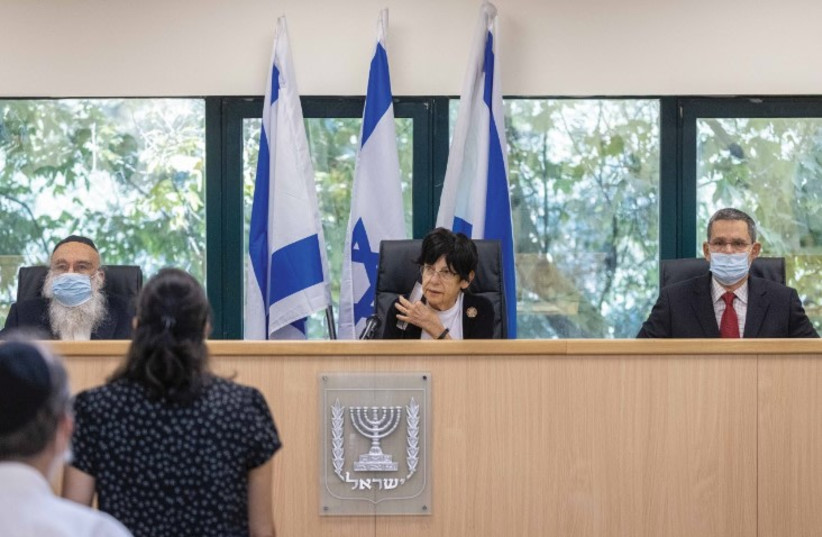Former Supreme Court president Miriam Naor died on Monday at the age of 74.
Besides serving as chief justice from 2015-2017 and in the courts for decades, she was currently heading the state commission of inquiry probing the Mount Meron disaster.
It was unclear who would replace her and when, though it was clear her death would cause delays in the inquiry’s progress.
Naor was known as a moderate activist who moved away from the more aggressive activism of former chief justices Aharon Barak and Dorit Beinisch, though more liberal than moderate conservative Asher Grunis, who immediately preceded her.
She was a moderate activist in that she was ready to declare even important government policies unconstitutional. But she mostly deferred to the state on any security issues and often even on controversial policy issues if minority rights might only be harmed in the future.

For example, she was part of the court that removed many settler outposts, struck down the state’s migrants policy multiple times, as well as a policy to give most haredim (ultra-Orthodox) an exemption from the IDF. Yet each time she delayed ruling for an extensive amount of time, the government’s policy played out and changed the facts on the ground.
On issues of religion and state, she approved mini-supermarkets in Tel Aviv opening on Shabbat and recognizing private conversion to Judaism for citizenship.
However, she was also part of a panel that widened the scope of enhanced interrogation of alleged Palestinian terrorist detainees that reduced the protections of the Supreme Court’s own 1999 anti-torture ruling, approved a law blocking Palestinian family reunification and approved a law that could allow smaller villages in the periphery avoid allowing in new Arab residents, provided they gave nonethnic excuses for the rejections.
Naor also approved the anti-Nakba Law, which blocks Gazan Palestinians from filing civil-damages claims in Israel (though the Barak court had allowed something similar), and a law permitting haredi schools to maintain their curriculums without teaching subjects viewed as core in state schools.
In the arena of public corruption, she was part of a majority in a split decision firing three mayors – Shlomo Lahiani of Bat Yam, Yitzhak Rochberger of Ramat Hasharon and Shimon Gafsou of Upper Nazareth – upon their indictment and prior to their conviction.
She was married to Aryeh Naor, who was former prime minister Menachem Begin’s cabinet secretary.
Until becoming chief justice, Naor kept a very low profile despite being on the High Court for 14 years and being Grunis’s deputy since May 2012.
Naor was born October 26, 1947.
She was viewed as a prodigy even at a young age and after her service in the IDF, obtaining her law degree from the Hebrew University of Jerusalem in 1971 and working in the State Attorney’s Office from 1972-1979. She was appointed as a Jerusalem Magistrate’s Court judge at the nearly unheard-of age of 33 in 1980.
Naor was the youngest judge in Israel at the time.
She moved up to the Jerusalem District Court in 1989 and the Supreme Court 11 years later.
As a district court judge, Naor made a name for herself in convicting and sentencing Shas Party founder Arye Deri and sentencing the heads of a number of banks to prison with heavy fines for economic crimes.
Eulogies praising Naor’s contribution to the country and the rule of law poured in from all corners of the political spectrum.
Prime Minister Naftali Bennett said Naor was a “respected jurist with years of achievements” who “treated all human beings respectfully and communicated in a harmonious way.”
She “maintained the appropriate balance between the disparate values in Israeli society... for the sake of strengthening the national and Zionist character of the State of Israel,” he added.
President Isaac Herzog said Naor “will be remembered in Israeli history as the queen of justice and as one of the titans of Israeli law – a wise, knowledgeable, sensitive, strong and independent woman who remained modest even as she sat on the highest courts in the land.”
Opposition leader Benjamin Netanyahu said Naor had always shown a “deep commitment to the State of Israel and the world of law, to which she contributed so much throughout her life.” He also recalled Naor coming to his home to visit with him and his wife, Sara.
Justice Minister Gideon Sa’ar said Naor was “an excellent judge and jurist, analytical, thorough, hardworking and fully on top of all the details,” who lived by the philosophy that “the ruling would be derived from the facts.”
Former justice minister and current Interior Minister Ayelet Shaked, who fought tenaciously with Naor for years over Supreme Court appointments, made it clear that despite their disagreements over policy, she had tremendous respect for Naor on a personal level.
Defense Minister Benny Gantz, Knesset Constitution, Law and Justice Committee chairman Gilad Yariv and Religious Zionist MK Simcha Rothman all expressed sadness at her passing.
Attorney-General Avichai Mandelblit, State Comptroller Matanyahu Englman, Israel Bar Association president Avi Himi and other top legal officials also expressed deep sadness over the loss of Naor, while declaring her to be “a top light” for the State of Israel.
Her funeral will be held on Tuesday at 12 noon in Jerusalem’s Sanhedria Cemetery.
